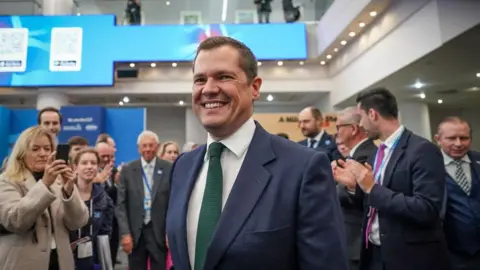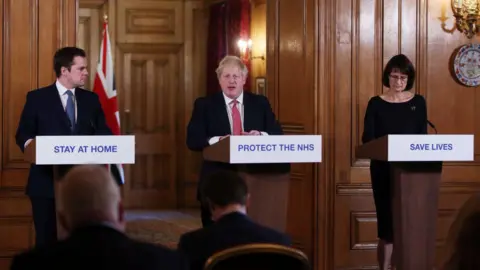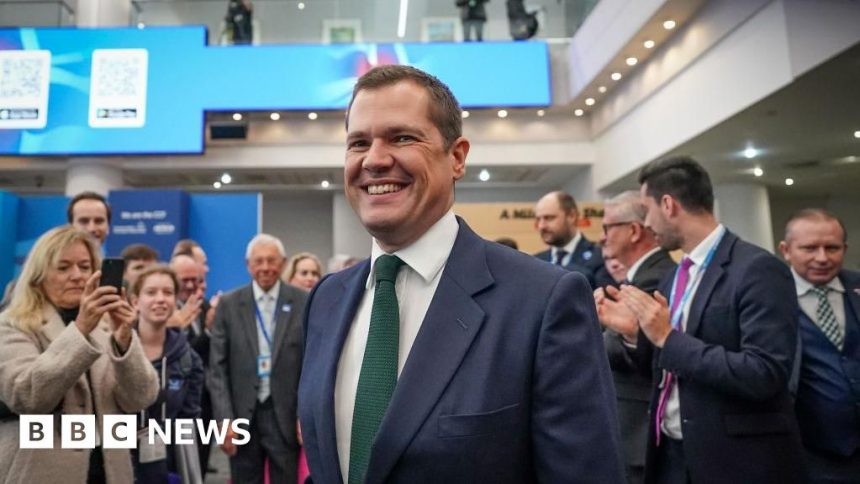Robert Jenrick: In a hurry to fix the Tory brand
 Getty Images
Getty ImagesRobert Jenrick has been on a political journey and looks to be a man in a hurry.
An MP at the age of 32, he arrived at Westminster as the first Conservative in 25 years to hold a seat for the party in a by-election while it was in power.
In the wake of the Tories’ worst result in a general election, he now wants to rebrand the party, arguing it failed in office on the economy, the NHS and immigration.
He quit as Rishi Sunak’s immigration minister in late 2023, but many believe he was contemplating a tilt at the leadership for some time before that.
Born in Wolverhampton in 1982, Jenrick grew up in Shropshire and Herefordshire, and went to a private school. His father was a gas fitter and his mother worked as a secretary.
He gained a first-class degree in history at Cambridge University and wrote for a student newspaper.
After working as a corporate lawyer in London and Moscow, he moved into business, becoming an international managing director at auction house Christie’s.
But politics beckoned. In the 2010 general election, he stood unsuccessfully as the Conservative candidate for Newcastle-under-Lyme in Staffordshire.
He made it into Parliament in 2014, in a by-election in Newark, Nottinghamshire, prompted by a cash-for-questions scandal. He saw off a challenge from Nigel Farage’s UK Independence Party, then riding high in the opinion polls.
Jenrick has held the seat ever since, and he likes to point out that since July he has been the last Tory MP standing in either Nottinghamshire or Derbyshire.
He is married to Michal Berkner, an Israeli-born and US-educated corporate lawyer. They have three daughters who they are bringing up as Jewish.
At the recent Conservative conference, Jenrick revealed he had given one of them the middle name Thatcher, in tribute to the late former PM.
He has been a strong supporter of Israel’s war against Hamas and Hezbollah, and has called for the UK to move its embassy in Tel Aviv to Jerusalem.
In 2022, following Russia’s invasion of Ukraine, the Jenrick household took in a Ukrainian refugee family, becoming the first MP’s family to do so.
More recently, Jenrick admitted using weight loss jab Ozempic for around six weeks, but said he “didn’t particularly enjoy it” and went on to lose weight “in the normal way” by eating healthier food and exercising more.
“To be honest, I was overweight,” he told the Politico website, adding he had lost four stone in 12 months.
 Getty Images
Getty ImagesAfter arriving at Westminster, Jenrick was a parliamentary aide to a number of cabinet ministers including Michael Gove, Liz Truss and Amber Rudd, before spending 18 months as a junior Treasury minister under Chancellor Philip Hammond.
Like Truss – another figure now on the Tory right – he voted to remain in the European Union in 2016. But he has since described Brexit as the last government’s greatest achievement.
In July 2019, Theresa May stood down as prime minister.
In the leadership election that followed, a crucial turning point was when three Conservative junior ministers – Jenrick, Rishi Sunak and Oliver Dowden – endorsed Boris Johnson in a joint article for The Times.
Sunak went on to be prime minister and Oliver Dowden his deputy, but in Johnson’s initial cabinet it was Jenrick whose star was brightest – he was the only one of the trio given full cabinet status. At 37, he became the first ever millennial cabinet minister.
Some Conservatives believe that Jenrick’s later rupture with Sunak was in part born of frustration that he had been “lapped” politically by his two old friends.
In 2019, his in-tray as housing, communities and local government secretary was a full one, containing some of Whitehall’s most intractable tasks – from dealing with councils struggling with real-term budget cuts, to trying to get more homes built.
Little more than six months into the job came additional demands caused by the coronavirus pandemic.
But it was political fallout from his housing brief that would result in the first break in his upward trajectory at Westminster.
Desmond decision row
To help meet a 2019 manifesto pledge to build 300,000 new homes a year, Jenrick wanted to speed up housebuilding by replacing case-by-case planning judgements with new rules based on zones and targets.
Many Conservative MPs were unimpressed, even more so when the Liberal Democrats won the previously very safe Tory seat of Chesham and Amersham in a by-election in June 2021 having strongly opposed local development.
Jenrick’s plans were later dropped.
He also faced questions about a decision to overrule the blocking of a £1bn building project in the Isle of Dogs, east London, proposed by publisher and Tory donor Richard Desmond – two weeks before Mr Desmond made a further donation.
It transpired the two men had sat together during a party fundraising dinner two months previously. Jenrick insisted he did not act improperly, but his decision was later overturned.
Separately, while a Covid lockdown was in place, it emerged he had driven 150 miles from London to his Herefordshire home, and then another 40 miles to deliver food and medicine, he said, to his isolating parents.
Downing Street publicly backed him and continued to use him as one of their most effective media firefighters when political difficulties mounted.
But in September 2021, he was sacked as part of a wider cabinet reshuffle.
 Getty Images
Getty ImagesHe returned to government a year later as a health minister under Truss – one of the prime minister’s rare appointments of a Sunak backer. And when Sunak entered Number 10, he took on the immigration brief and attended cabinet.
Many believed that the Tory moderate had been sent to the Home Office to, in effect, “man mark” Suella Braverman, the much more hardline home secretary. The pair were widely expected to fall out.
In fact, Braverman and Jenrick were Cambridge University contemporaries who attended each other’s weddings.
In any case, their relationship was helped by a clear shift in Jenrick’s approach while he was in the role. This is something he acknowledges, saying his views were hardened by what he learnt about the immigration system in the Home Office.
Earlier as communities secretary when working closely with the Home Office on immigration and extremism, he is understood to have become frustrated that the Home Office was seen as the “bad cop” on these issues while his own department was seen as the “good cop,” and he resolved to tackle that.
In one of his most notable actions as immigration minister, in July 2023 Jenrick was criticised for ordering that murals of cartoon characters be painted over at a reception centre for child asylum seekers in Dover. He now says this was a mistake.
In December 2023, he resigned from Sunak’s cabinet, saying the prime minister’s emergency Rwanda legislation did not go far enough and would not work.
Ever since, he has been outspoken about what he sees as his party’s failure to deliver on its promises to cut immigration, leading calls for the UK to withdraw from the European Convention on Human Rights and for a legal cap on migration.
This helped him attract support from MPs previously loyal to his former boss, Suella Braverman, who ruled herself out of the leadership contest.
At the Tory conference, Jenrick provoked a backlash from two of his leadership rivals by claiming that British special forces were “killing rather than capturing terrorists” because of human rights law – but stood by it.
His pitch is that the party needs to “get serious” and confront hard truths – and that only he can make the changes needed to win the next election.
Jenrick says a “clear plan”, not “platitudes” – a dig at rival Kemi Badenoch – is needed to settle key Tory policies so the party can win back the public’s trust.







